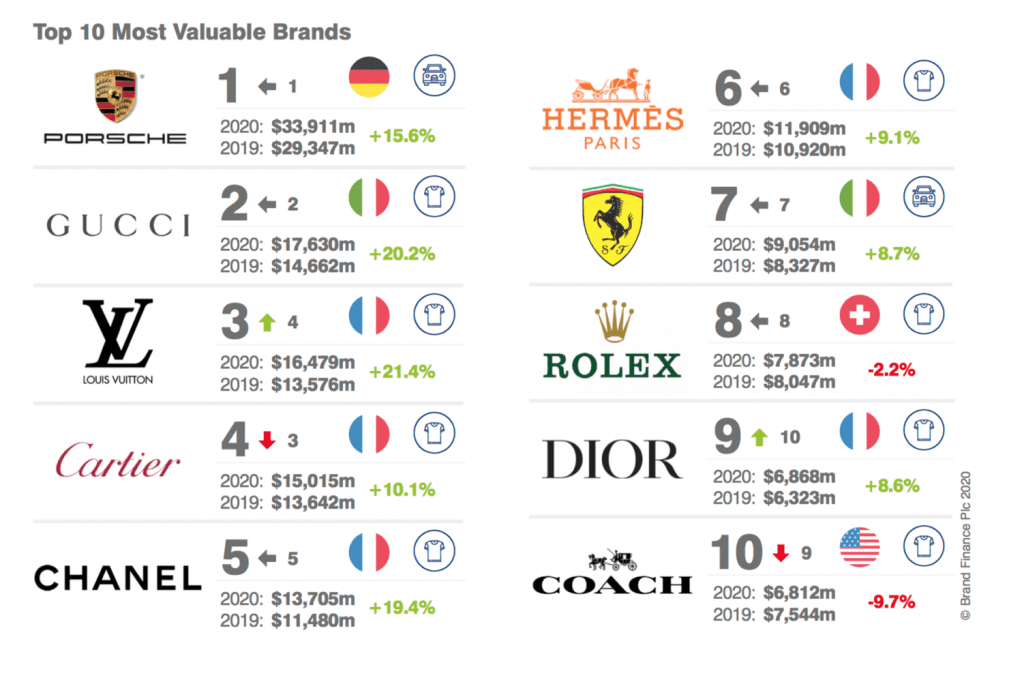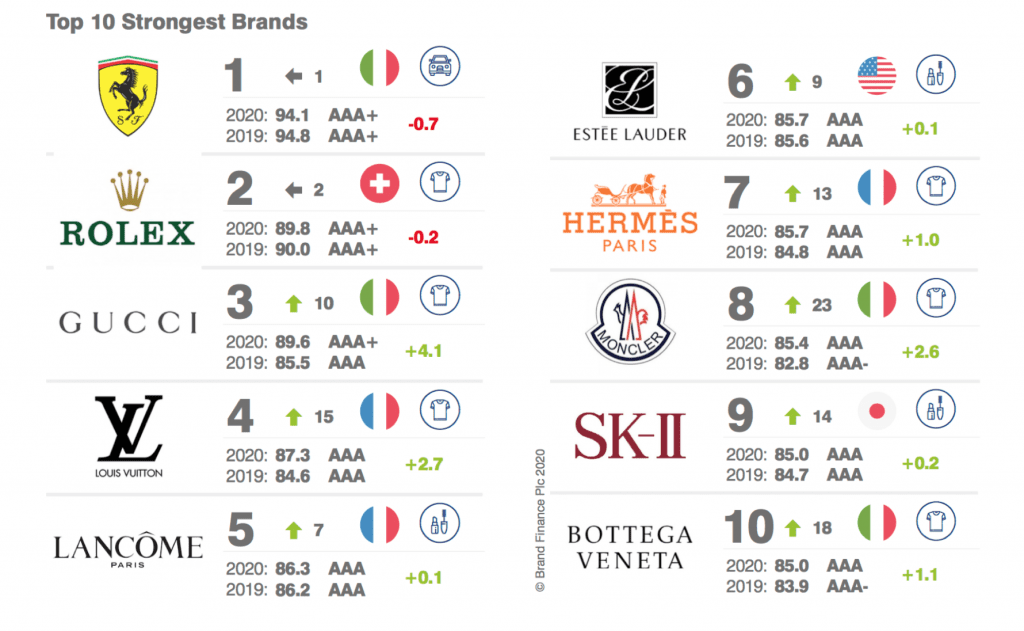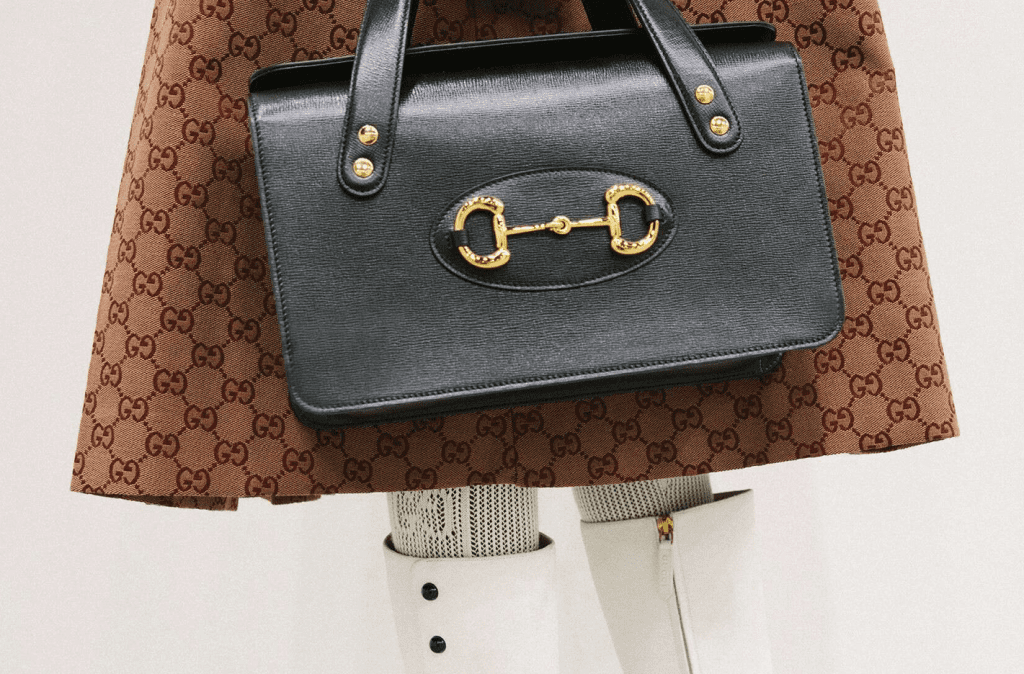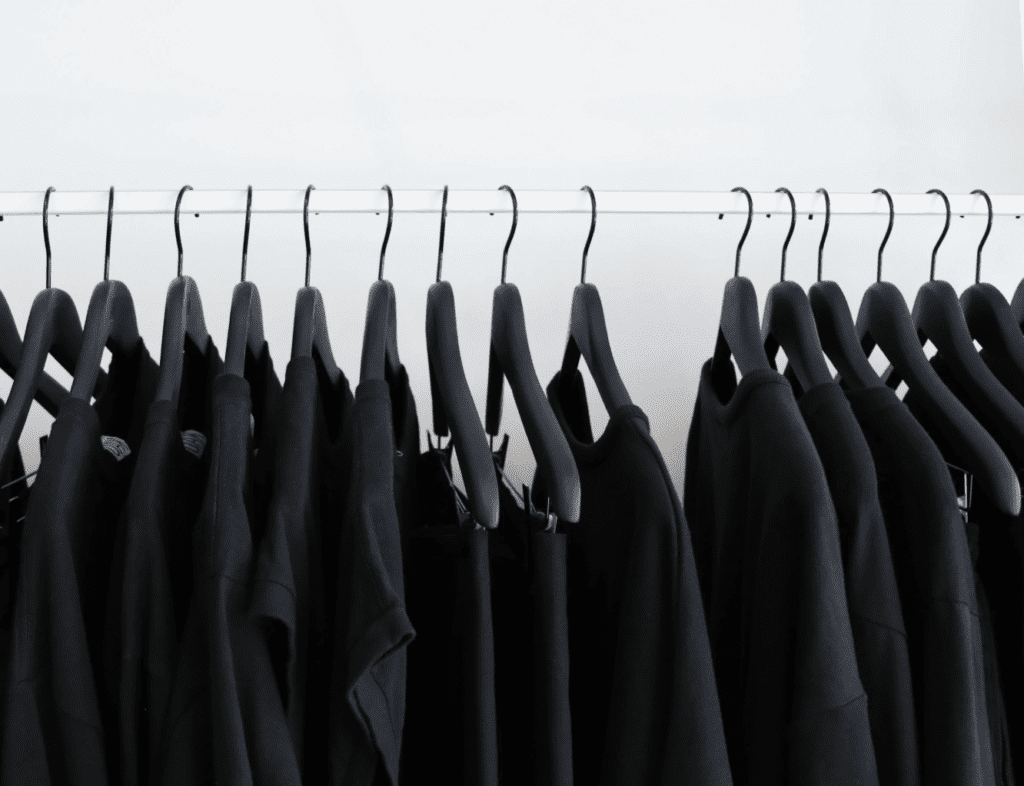On the heels of predicting in April that global companies should expect a collective loss in value of some $1 trillion as a result of the impact of COVID-19, Brand Finance has since asserted that up to $35 billion of the loss could be clawed from the world’s top 50 most valuable luxury and premium brands. However, Brand Finance’s annual report – which aims to gauge and rank the brand-specific value of entities within the luxury and premium space – is not all gloom, as the likes of Porshe, Givenchy, Ferrari, and Gucci, among others, have fared well in terms of the value of their intangible assets in the market even if their sales have been significantly stunted amid the global health pandemic.
Breaking its ranking down in a few different ways, Brand Finance – which aims to bridge the gap between a company’s marketing and financial performance – focuses primarily on the most “valuable” brands. The London-based business valuation consultancy defines “brand value” as “the value of the “names, terms, signs, symbols, logos, and designs” that a company uses to identify and distinguish its “goods, services or entities” from those of others, thereby creating “distinctive images and associations in the minds of stakeholders, and generating economic benefits” for the company as a result. In other words, as distinct from a purely financial ranking, Brand Finance is looking at the value of a company’s trademark(s) and the “associated marketing intellectual property within the branded business.”
“Most Valuable Brands”

For the 2019 to 2020 period, Brand Finance put Porsche atop of the list of the “most valuable brands,” with the car company once again retaining the title of the world’s most valuable luxury and premium brand “by a considerable margin, following a 16 percent brand value increase to $33.9 billion.”
The German company’s ability to “cement itself as the epitome of luxury [thanks to] a brand renowned for its superior quality and world-class sports car manufacturing,” and its decision to “rise to the challenge of an increasingly eco-conscious society, and become a pioneer in sustainability through the introduction of its first electric vehicle” have had a hand in ensuring its top spot, per Brand Finance. Beyond that, the report states (unsurprisingly) that for Porsche – which sold “a staggering 86,000 units in China in 2019, alone” – and other similarly-situated brands, “there is no denying” the impact and “the importance of the Chinese market” in ensuring the current value of its brand and future gains in that value.
Kering’s marquee brand Gucci took the number 2 spot on the “most valuable brands” list, followed by Louis Vuitton at number 3, and Cartier (4), Chanel (5), Hermès (6), Ferrari (7), Rolex (8), Dior (9), and interestingly enough, premium brand Coach (10). Louis Vuitton’s number 2 position and Chanel’s number 4 spot are noteworthy given that they are the two highest revenue-generating brands within the luxury fashion arena.
While Givenchy did not make it onto the top ten list Brand Finance noted that the LVMH Moët Hennessy Louis Vuitton-owned brand was “the fastest-growing brand in this year’s ranking,” with its brand value growing “an impressive” 74 percent to $2.0 billion, simultaneously jumping 11 spots in the ranking from 37th to 26th. Brand Finance pointed to Givenchy’s “strong performance and growth, particularly in its makeup division” as helping to boost its ranking, and its focus on further developing its omni-channel e-commerce platform. (It will be telling whether the brand maintains such momentum under the watch of newly-installed creative director Matthew Williams). Meanwhile, the report states that Louis Vuitton was the fastest growing brand in the top 10, increasing by 21 percent to $16.5 billion, while Chanel recorded a solid 20 percent increase in brand value for a total of $13.7 billion.
Not all companies are on the up-and-up. According to the report, Valentino’s brand value dropped between 2019 and 2020 by 39.1 percent. At the same time, the respective value of Bentley, Maserati and Aston Martin also dropped by double digits, while Dolce & Gabbana and Salvatore Ferragamo were respectively down by 20.8 and 13.2 percent.
“Strongest Brands”

In a separate ranking, Brand Finance quantifies the overall “strength” of a brand (and its intellectual property) – which it says is a “crucial driver of brand value alongside revenue forecasts” – by looking at “relevant attributes, such as marketing investment, [consumer] familiarity and loyalty, staff satisfaction, and corporate reputation, among others.” Ferrari topped this list again this year, with its brand value improving by 9 percent to $9.1 billion.
Speaking specifically about the Italian automaker, Brand Finance’s Valuation Director Alex Haigh stated that Ferrari’s “outstanding brand strength reflects the fact that it continues to be admired and desired around the world.” It is “no wonder,” he says, “that many consumers, who might never own a Ferrari car, want a bag or a watch emblazoned with the Prancing Horse, but it is also crucial that management remain at the steering wheel of the brand’s future and maintain its exclusive positioning by monitoring the licensing output closely.”
In the second through tenth positions on the “strongest brands” list are Rolex, Gucci, Louis Vuitton, Lancome, Estee Lauder, Hermès, Moncler, SK-II, and Bottega Veneta, respectively.
Companies in COVID
To gauge the impact of the COVID-19 pandemic on the various brands in the luxury and premium markets, Brand Finance broke the companies at issue down into three sub-sectors, namely, apparel, automobiles and cosmetics & personal care. The consultancy revealed that its analysis has shown that “these sub-sectors are likely to be impacted differently by coronavirus, with apparel brands the most heavily impacted, facing a 20 percent brand value loss; autos moderately impacted, facing a 10 percent brand value loss; and cosmetics brands largely sheltered from the damage of pandemic.”











